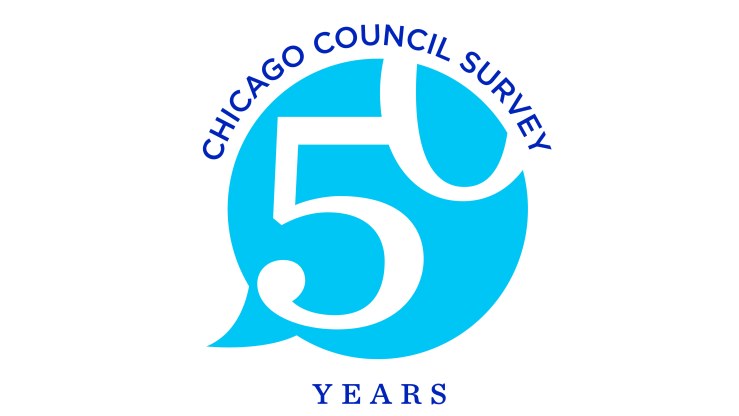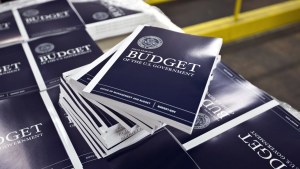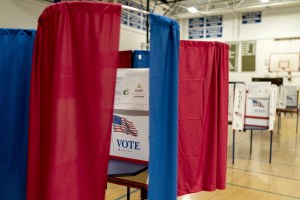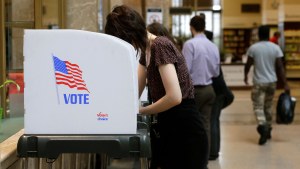Republicans are focused on inflation and immigration ahead of the November election, while Democrats emphasize abortion policies and democracy.
The 2024 US presidential election is shaping up to be a race like no other in American political history. According to the 2024 Chicago Council Survey (CCS), fielded June 21–July 1, 2024, most Americans are paying close attention to the electoral contest and intend to vote in November. The data show economics, immigration, and democracy are the most salient issues to American voters. When it comes down to the integrity of the election, many think foreign interference, political violence, and weakening democracy are critical threats.
Key Findings
- Seven in 10 Americans (68%) say they are somewhat (35%) or very (33%) closely following news about the election.
- More than half of Americans say issues like democracy (59%), the economy (58%), and inflation (53%) will be important in their voting decisions in November.
- The wars between Russia and Ukraine (50% great deal + fair amount) and Israel and Gaza (47%) play a lesser role in electoral decisions than other domestic issues like immigration (73%), crime (70%), and abortion (64%).
- Majorities of Republicans say the economy (76%), inflation (75%), and immigration (69%) will play the greatest role in their voting decisions, while Democrats say democracy (69%) and abortion (63%) will most affect their votes.
- Prior to the assassination attempt on former President Donald Trump, roughly half of Americans considered the possibility of political violence (49%) or foreign interference (54%) related to the 2024 presidential election a critical threat.
Many Watching Election Developments Closely
The assassination attempt on former President Donald Trump, withdrawal of President Joe Biden from the race, and his subsequent endorsement of Vice President Kamala Harris as the Democratic nominee have reshaped the race late in the campaign cycle.
Data from the 2024 Chicago Council Survey, which was conducted after the first presidential debate, but before President Biden dropped out of the race, show that seven in 10 Americans (68%) say they are very (33%) or somewhat closely (35%) following news about the election.
Across partisan affiliations, Republicans (76%) and Democrats (74%) are more likely than Independents (56%) to say they are following the race very or somewhat closely (identical percentages of Republicans and Democrats are following very closely). Gallup surveys show that in May, Democrats were following the presidential election more closely than previous races, while Republicans were paying about as close attention to the election as they did in 2000, when George W. Bush and Al Gore competed for the presidency.
Americans are more likely to report following news about the presidential election than news about any other domestic or foreign policy issue asked about in this survey. However, news about the economy (29% very closely) is a close second, with immigration (21%) attracting very close attention from two in 10 Americans. 1
Economy, Inflation, and US Democracy Core Issues for Voters
The news stories that matter most to constituencies generally land as top voting factors for them. When asked how much of a role various domestic and foreign policy issues would play in their electoral decisions, majorities of Americans say protecting US democracy (59%), the economy (58%), and inflation (53%) will impact their voting decisions a great deal. Roughly four in 10 Americans also say immigration (44%), abortion policies (43%), and crime 39%) matter greatly when deciding for whom to vote.
Protecting democracy is not only a high voting priority for Americans, but a major concern. Two-thirds (67%) believe weakening democracy in the United States is a critical threat to the United States (75% Democrats, 62% Republicans, 62% Independents). In a March 2024 AP-NORC survey, just over half of Americans overall said US institutions and political leaders like Congress (54%), Donald Trump (53%), and the Republican Party (52%) do a poor job of upholding democratic values. Just under half say the same about Joe Biden (48%), the Supreme Court (45%), and the Democratic Party (44%).
While large majorities of Americans say inflation, the economy, protecting democracy, crime , and immigration are factors in their voting decisions, there are differences in the extent to which each issue will factor in decisions across partisan affiliations. When it comes to issues that weigh most heavily on their voting decisions, Republicans are most likely to consider the economy (76%), inflation (75%), and immigration (69%). On the other hand, Democrats say that protecting democracy (69%) and abortion policies (63%) will influence their votes.
Despite high-profile coverage of antiwar protests across the United States and recent focus on the war in Ukraine during the NATO summit, 2024 Council data show that foreign conflicts are less influential to voting decisions (among those issues presented). While roughly half of Americans say the Russia-Ukraine war (50%) or the Israel-Gaza war (47%) will play a great deal or fair amount of a role in their presidential vote, no more than two in 10 say it will impact their decisions a great deal (19% Russia-Ukraine war; 17% war in Gaza).
The voters most likely to turn out to vote (“very likely” voters) are more keenly focused on these issues than average Americans. For example, they are 12 percentage points more likely to say the issue of democracy will greatly affect their voting decisions (71%, compared to 59% of overall Americans). They are also slightly more likely than the general public to greatly consider abortion, immigration, inflation, and crime when voting. However, when it comes to the influence that the wars in Gaza and Ukraine will have on their voting choices, very likely voters look similar to other Americans (see appendix tables 3-4).
Before Trump Assassination Attempt, Half of Americans Feared Political Violence and Foreign Interference in Elections
Even before the assassination attempt on former President Trump on July 17, half of Americans (49%) said they were concerned about political violence around the 2024 election. Two thirds of Democrats (65%), nearly half of Independents (47%) and a third of Republicans (33%) consider the possibility of violence around the election a critical threat facing the country.
Made all the more relevant in light of what the Trump campaign characterizes as a hack conducted by Iranian actors, half of Americans (54%) also consider foreign interference in US elections to be a critical threat. Democrats and Independents express greater concern about this possibility than Republicans (see appendix table 1).
The 2023 Chicago Council Survey also found that 62 percent of Americans consider political polarization in the United States a critical threat, up from half when first asked in 2018. While this is a bipartisan concern, Americans do not seem to hold themselves accountable for this increase in polarized opinion. As Pew research has shown, many Americans express deeply negative views of Americans who affiliate themselves to the other party.
Most Americans Intend to Vote in 2024 Election, but Independents Less Likely
In 2020, 67 percent of eligible voters voted in the presidential election, marking the highest voter turnout of the 21st century. Today, eight in 10 Americans say they are very (71%) or somewhat likely (11%) to vote in the 2024 presidential election; however, actual turnout is likely to be lower. Across partisan groups, a higher percentage of Republicans say they are very likely to vote (82%), followed by Democrats (76%). Independents—a battleground group for the 2024 candidates—are the least likely to say they are very likely to turnout on Election Day (58%).
Conclusion
With Kamala Harris as the new Democratic nominee, some analysts say that a national debate over issues, rather than the top candidates’ fitness for the presidency, could return to the fore. On Election Day, a candidate’s position on democracy and abortion will have the greatest bearing on the votes of Democrats, who largely believe that the two would be at risk under former President Trump’s conservative administration. On the other hand, Republicans will take a candidate’s proposed economic policies, measures to curb inflation, and stance on immigration into the greatest consideration when voting.
- 1Different partisan groups are also attentive to news about different issues. Republicans are particularly watchful of news about the economy (38% follow very closely) and immigration (34% very closely), while Democrats are more likely to report following news about climate change very closely (25%). Independents are most likely to follow news about the economy very closely (29%), followed by news about the presidential election (25%). See appendix figure 1 for full breakdown.
This analysis is based on data from the 2024 Chicago Council Survey of the American public on foreign policy, a project of the Lester Crown Center on US Foreign Policy. The 2024 Chicago Council Survey was conducted June 21–July 1, 2024, by Ipsos using its large-scale nationwide online research panel, KnowledgePanel, in English and Spanish among a weighted national sample of 2,106 adults 18 or older living in all 50 US states and the District of Columbia. The margin of sampling error for the full sample is ±2.3 percentage points, including a design effect of 1.1229. The margin of error is higher for partisan subgroups (±4.2 points for Republicans, ±3.9 points for Democrats, and ±3.8 points for Independents.) or for partial-sample items.
Partisan identification is based on how respondents answered a standard partisan self-identification question: “Generally speaking, do you think of yourself as a Republican, a Democrat, an Independent, or what?”
The 2024 Chicago Council Survey is made possible by the generous support of the Crown family, the Korea Foundation, and the United States-Japan Foundation.
Table 1. Critical Threats to Vital US Interests in 10 Years
Below is a list of possible threats to the vital interests of the United States in the next 10 years. For each one, please select whether you see this as a critical threat, an important but not critical threat, or not an important threat at all. (% critical threat)
| Overall | Republican | Democrat | Independent | R-D Gap | |
|---|---|---|---|---|---|
| Large numbers of immigrants and refugees coming into the US |
50 |
83 | 27 | 45 | 56 |
| Climate change | 47 | 17 | 72 | 48 | -55 |
| International terrorism | 53 | 65 | 51 | 43 | 14 |
| North Korea’s nuclear program | 52 | 59 | 53 | 45 | 6 |
| Iran’s nuclear program | 53 | 62 | 52 | 45 | 10 |
| Lack of a peace agreement between Israel and the Palestinians | 31 | 27 | 39 | 26 | -12 |
| The war between Israel and Hamas escalating into a wider war in the Middle East | 41 | 42 | 49 | 34 | -7 |
| Weakening democracy in the United States | 67 | 62 | 75 | 64 | -13 |
| Russia’s territorial ambitions | 50 | 48 | 60 | 42 | -12 |
| China’s territorial ambitions | 48 | 61 | 49 | 36 | 12 |
| Economic competition from China | 33 | 45 | 25 | 30 | 20 |
| Political violence around the 2024 election | 49 | 33 | 65 | 47 | -32 |
| Foreign interference in American elections | 54 | 51 | 61 | 50 | -10 |
Table 2. Critical Threat of Political Polarization in the United States Over Time
Below is a list of possible threats to the vital interests of the United States in the next 10 years. For each one, please select whether you see this as a critical threat, an important but not critical threat, or not an important threat at all. Political polarization in the United States (% critical threat)
| Overall | Republican | Democrat | Independent | R-D Gap | |
|---|---|---|---|---|---|
| 2018 | 50 | 41 | 57 | 50 | -16 |
| 2019 | 49 | 43 | 51 | 50 | -8 |
| 2020 | 55 | 52 | 59 | 56 | -7 |
| August 2021 | 63 | 63 | 67 | 61 | -4 |
| March 2022 | 55 | 54 | 58 | 54 | -4 |
| 2023 | 61 | 62 | 64 | 58 | -2 |
Table 3. Weight of Domestic and Foreign Policy Issues on Vote Between Overall Partisans and Those Very Likely to Vote
How much of a role will the following issues play in your decisions for whom to vote in the 2024 presidential election? (% great deal)
| Overall | Republican | Democrat | Independent | |
|---|---|---|---|---|
| Protecting US democracy | 59 | 58 | 69 | 51 |
| Economy in general | 58 | 76 | 46 | 54 |
| Inflation | 53 | 75 | 38 | 48 |
| Immigration | 44 | 69 | 26 | 41 |
| Abortion policies | 43 | 29 | 63 | 35 |
| Crime | 39 | 53 | 32 | 36 |
| Russia-Ukraine war | 19 | 17 | 20 | 19 |
| Israel-Gaza war | 17 | 19 | 16 | 16 |
Table 4. Weight of Domestic and Foreign Policy Issues on Vote Between Overall Partisans and Those Very Likely to Vote
How much of a role will the following issues play in your decisions for whom to vote in the 2024 presidential election? (% great deal among very likely voters)
| Overall | Republican | Democrat | Independent | |
|---|---|---|---|---|
| Protecting US democracy | 71 | 64 | 81 | 68 |
| Economy in general | 64 | 82 | 48 | 64 |
| Inflation | 57 | 80 | 37 | 55 |
| Immigration | 51 | 77 | 27 | 51 |
| Abortion policies | 50 | 31 | 72 | 45 |
| Crime | 44 | 58 | 31 | 42 |
| Russia-Ukraine war | 22 | 19 | 23 | 24 |
| Israel-Gaza war | 19 | 20 | 17 | 20 |





Related Content
 Public Opinion
Public Opinion
The public wants to increase the budget for domestic issues like infrastructure and education but is divided over defense spending and foreign assistance.
 Public Opinion
Public Opinion
Results and analysis of the Council's annual survey of American views on foreign policy.



